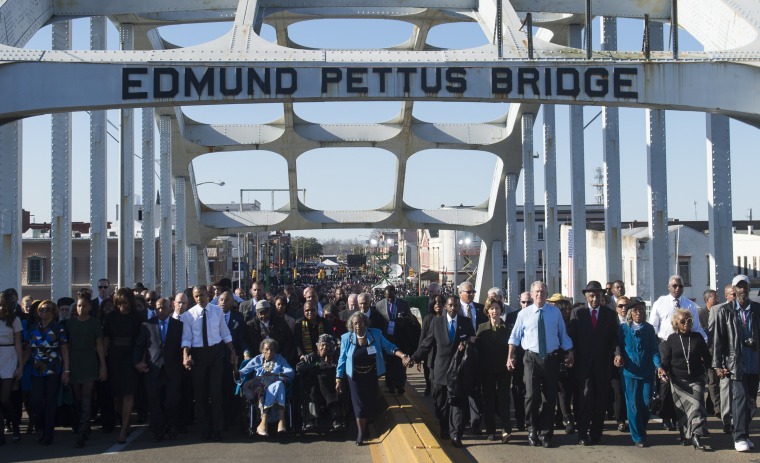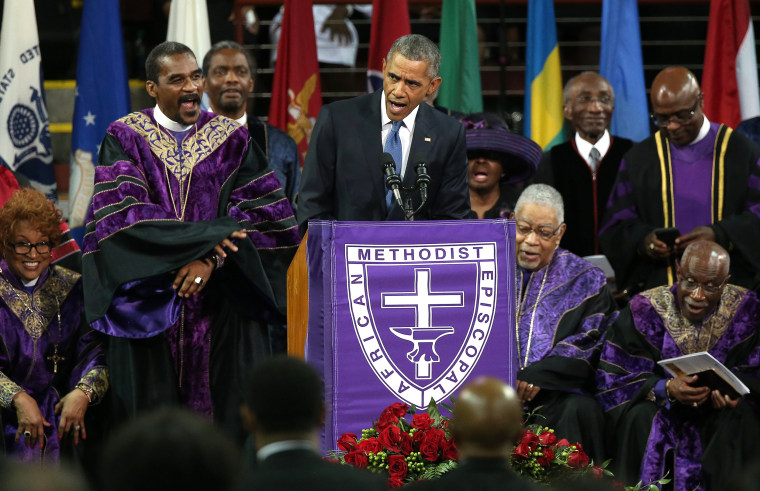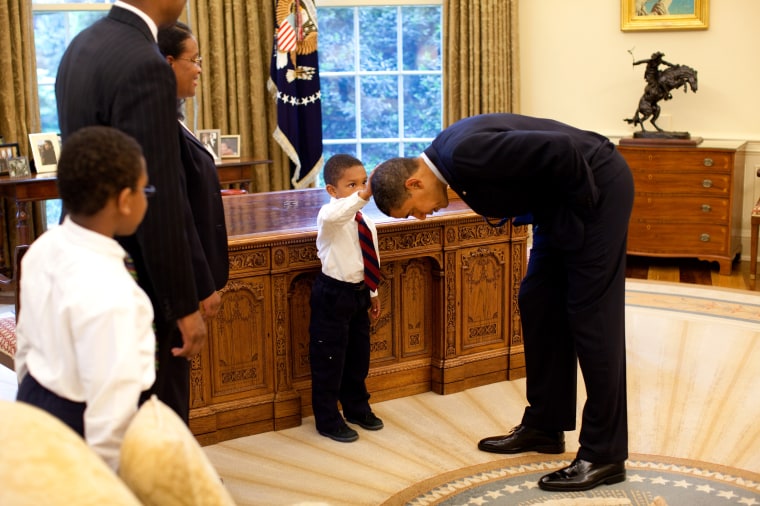The first significant controversy of the first black president's tenure in office was a racial one.
When President Obama came to the defense of African-American Harvard Prof. Henry Louis Gates — who was arrested while trying to enter his own home and said the white officer involved acted “stupidly,” an erosion in his already tenuous white support began and never fully recovered.
Obama tried to make the most of this so-called “teachable moment,” by holding a "beer summit" with Gates and the policeman. The meeting however was ridiculed for being ineffectual in terms of addressing implicit bias. The critique that emerged became a familiar one — that the first black president was passing up an opportunity to truly enlighten the country on race.
But, historians and political experts say that premise overlooked that race is a subject that Obama has often delved deeply into; first as an author, then as a candidate and eventually as a president.
Related: How Americans See Race and Racial Relations is Shifting Dramatically
"Every time the president, in a delicate parsed way, talked about the racial challenges before the country and the fact that the challenges didn't start yesterday and didn't start with his administration or begin or end with the police, he forced a deeper conversation," NAACP president and CEO Cornell William Brooks told NBC News. "There are many who wish he went farther but relative to what we've heard in the past it's simply unprecedented."
The national dialogue on race that President Bill Clinton called for nearly 20 years ago has arrived — and it was a biracial product of an improbable Kenyan-Kansan relationship who would be drafted to lead it, sometimes reluctantly, and often eloquently. And while, his election brought hopes for a post-racial utopia for some and reparations for others, neither result may have been feasible.
Instead, Obama’s ascension seemed to shine a light on the nation’s bigotry — as evidenced by the unapologetically racist vitriol he and his family have been subjected to. It also brought attention to people of color’s desire for equitable respect and representation.
Obama had the Herculean task of rescuing one of worst economies any incoming president has even inherited — which had disproportionately taken a toll on the African-American community — while presiding over a period marked repeatedly by racially polarizing police shootings (spawning the "Black Lives Matter" movement). It was also a period which saw an unprecedented expansion of efforts to curtail voting rights and the successful gutting of the Voting Rights Act.

The president responded to these crises with a mixture of policy and the personal.
In some cases he went big — with stimulus spending and the Affordable Care Act — and he also made smaller but not insignificant gestures like diverting more resources to historically black colleges and his My Brother’s Keeper initiative, which is specifically targeted at young men of color who are living in at-risk areas.
Related: Obama’s My Brother’s Keeper initiative gets $104 million boost
He also spoke in fiercely emotional terms about the shooting deaths of young black men like Trayvon Martin, famously saying "If I had a son, he’d look like Trayvon." He repeatedly attempted to speak truthfully about the real gulf that exists between law enforcement and communities of color in this country.
And yet, despite consistent sky-high approval ratings with African-American voters, Obama has been harshly criticized for not using his bully pulpit more to advance the conditions of black America.
"He's not Jesse Jackson, he's not Al Sharpton, he's not even Van Jones," said Mark Anthony Neal, professor of African and African-American studies at Duke University. "You had these clear examples of anti-black racism, and he had an inability to really show any sense of connection to what's going in these communities. His rhetoric was moreso to lecture black folks. That's just the way he processes race in America."
Obama has routinely argued that he must be president for all Americans, and as the Gates affair demonstrated, he took great political risks by wading into racial politics.
"I think his administration, particularly his support system, were surprised at the kind of pushback he got to [the Gates incident]," added Neal. "From that moment on his inner circle was very much afraid of taking on race issues more directly."
During his presidency, he was accused of being racist himself, of favoring blacks over whites, of not loving America, of having terrorist sympathies and perhaps most infamously, not being a U.S. citizen.
Amid that onslaught, Obama projected a cool and calm demeanor.
In his recent piece in The Atlantic, author and columnist Ta-Nehisi Coates argued that the president's tempered demeanor was borne both out of political necessity but also an inherent faith in the decency of most white people, forged early in his life through his positive interactions with his white ancestors.
"He had an ability to emote a deep and sincere connection to the hearts of black people, while never doubting the hearts of white people," Coates wrote. "For eight years Barack Obama walked on ice and never fell. Nothing in that time suggested that straight talk on the facts of racism in American life would have given him surer footing."
And while his conciliatory nature has left some apoplectic, Obama has forged his own subtle path on race.
He has made history by appointing the first and second African-American attorney generals, signed a significant reduction in the racially biased sentencing disparity between crack and cocaine arrests, and has been credited with revitalizing the federal government’s civil rights division.
"The administration changed the guidance used federally in terms of profiling," Brooks said. "They got more granular about who can be deemed dangerous. You don’t see it on a billboard or a Twitter feed but it was critically important."
"The White House would have done well to actually talk more about those kinds of successes," Neal added.
Related: In Wake of Police Shootings, Obama Speaks More Bluntly About Race
Still, the most significant contribution the president may have made to our country’s legacy on race is a purely visual one. For many, Obama was a visceral manifestation of America's morphing multicultural face.
"He really is emblematic of the kinds of changes and shifts we’ve seen in mainstream corporate culture, the military establishment," Neal said. "There is no question that symbolically he represented something that is important."
As the first post-Vietnam generation president with a facility with pop culture and social media, Obama was accessible to younger generations in a way no president has been since perhaps John F. Kennedy. And, for a whole generation of Americans, the idea of a black president was a reality instead a pipe dream.

That symbolism has often served as inspiration, for instance when he performed the role of consoler-in-chief following the racially motivated massacre of nine African-Americans at the historically black Emanuel AME church in Charleston, South Carolina.
Related: A presidential speech sometimes change a life
While delivering a eulogy for the victims, an emotional Obama began singing the classic spiritual “Amazing Grace.” The president had shown off his able baritone before, but the content and context this time could not have been more different.
This was our nation’s first black president seeking to soothe racial wounds in real time. There would be more deaths and pain in the black community in the weeks and months to come, yet in that moment Obama's very presence was historic, but it was also just a start.
"The legacy of President Obama is one of what he inspired and what he accomplished," Brooks said. "What he will be credited with accomplishing has everything to do with the incoming administration, but what he has inspired the incoming administration can’t touch."
